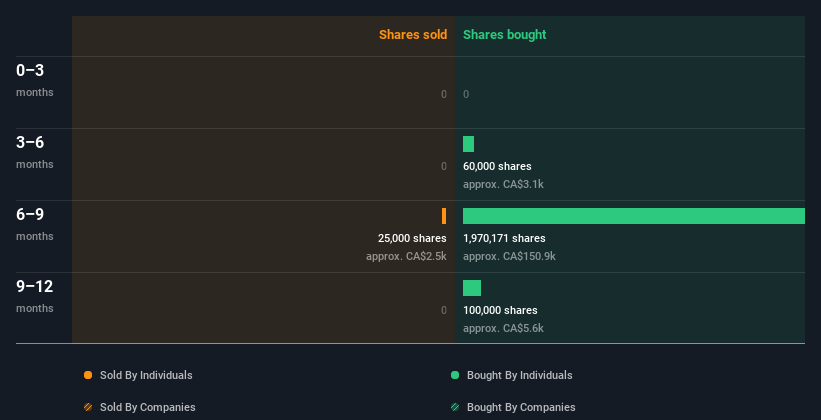- Canada
- /
- Medical Equipment
- /
- TSXV:FREQ
Frequency Exchange's Market Cap Up CA$1.3m Following Year Of Insider Stock Buying

Last week, Frequency Exchange Corp. (CVE:FREQ) insiders, who had purchased shares in the previous 12 months were rewarded handsomely. The shares increased by 25% last week, resulting in a CA$1.3m increase in the company's market worth, implying a 58% gain on their initial purchase. Put another way, the original CA$202.5k acquisition is now worth CA$319.5k.
Although we don't think shareholders should simply follow insider transactions, we would consider it foolish to ignore insider transactions altogether.
See our latest analysis for Frequency Exchange
Frequency Exchange Insider Transactions Over The Last Year
Over the last year, we can see that the biggest insider purchase was by Independent Director Keith Pyne for CA$189k worth of shares, at about CA$0.10 per share. Although we like to see insider buying, we note that this large purchase was at significantly below the recent price of CA$0.15. Because the shares were purchased at a lower price, this particular buy doesn't tell us much about how insiders feel about the current share price.
Over the last year, we can see that insiders have bought 2.13m shares worth CA$203k. But they sold 25.00k shares for CA$2.5k. In the last twelve months there was more buying than selling by Frequency Exchange insiders. The chart below shows insider transactions (by companies and individuals) over the last year. If you want to know exactly who sold, for how much, and when, simply click on the graph below!

There are always plenty of stocks that insiders are buying. So if that suits your style you could check each stock one by one or you could take a look at this free list of companies. (Hint: insiders have been buying them).
Does Frequency Exchange Boast High Insider Ownership?
Looking at the total insider shareholdings in a company can help to inform your view of whether they are well aligned with common shareholders. A high insider ownership often makes company leadership more mindful of shareholder interests. Frequency Exchange insiders own about CA$1.0m worth of shares. That equates to 16% of the company. We've certainly seen higher levels of insider ownership elsewhere, but these holdings are enough to suggest alignment between insiders and the other shareholders.
So What Do The Frequency Exchange Insider Transactions Indicate?
There haven't been any insider transactions in the last three months -- that doesn't mean much. On a brighter note, the transactions over the last year are encouraging. Insiders do have a stake in Frequency Exchange and their transactions don't cause us concern. So these insider transactions can help us build a thesis about the stock, but it's also worthwhile knowing the risks facing this company. At Simply Wall St, we've found that Frequency Exchange has 7 warning signs (6 are a bit unpleasant!) that deserve your attention before going any further with your analysis.
Of course, you might find a fantastic investment by looking elsewhere. So take a peek at this free list of interesting companies.
For the purposes of this article, insiders are those individuals who report their transactions to the relevant regulatory body. We currently account for open market transactions and private dispositions of direct interests only, but not derivative transactions or indirect interests.
New: AI Stock Screener & Alerts
Our new AI Stock Screener scans the market every day to uncover opportunities.
• Dividend Powerhouses (3%+ Yield)
• Undervalued Small Caps with Insider Buying
• High growth Tech and AI Companies
Or build your own from over 50 metrics.
Have feedback on this article? Concerned about the content? Get in touch with us directly. Alternatively, email editorial-team (at) simplywallst.com.
This article by Simply Wall St is general in nature. We provide commentary based on historical data and analyst forecasts only using an unbiased methodology and our articles are not intended to be financial advice. It does not constitute a recommendation to buy or sell any stock, and does not take account of your objectives, or your financial situation. We aim to bring you long-term focused analysis driven by fundamental data. Note that our analysis may not factor in the latest price-sensitive company announcements or qualitative material. Simply Wall St has no position in any stocks mentioned.
About TSXV:FREQ
Frequency Exchange
Focuses on the development and commercialization of a wearable frequency delivery system for the health and wellness market.
Medium-low with imperfect balance sheet.

